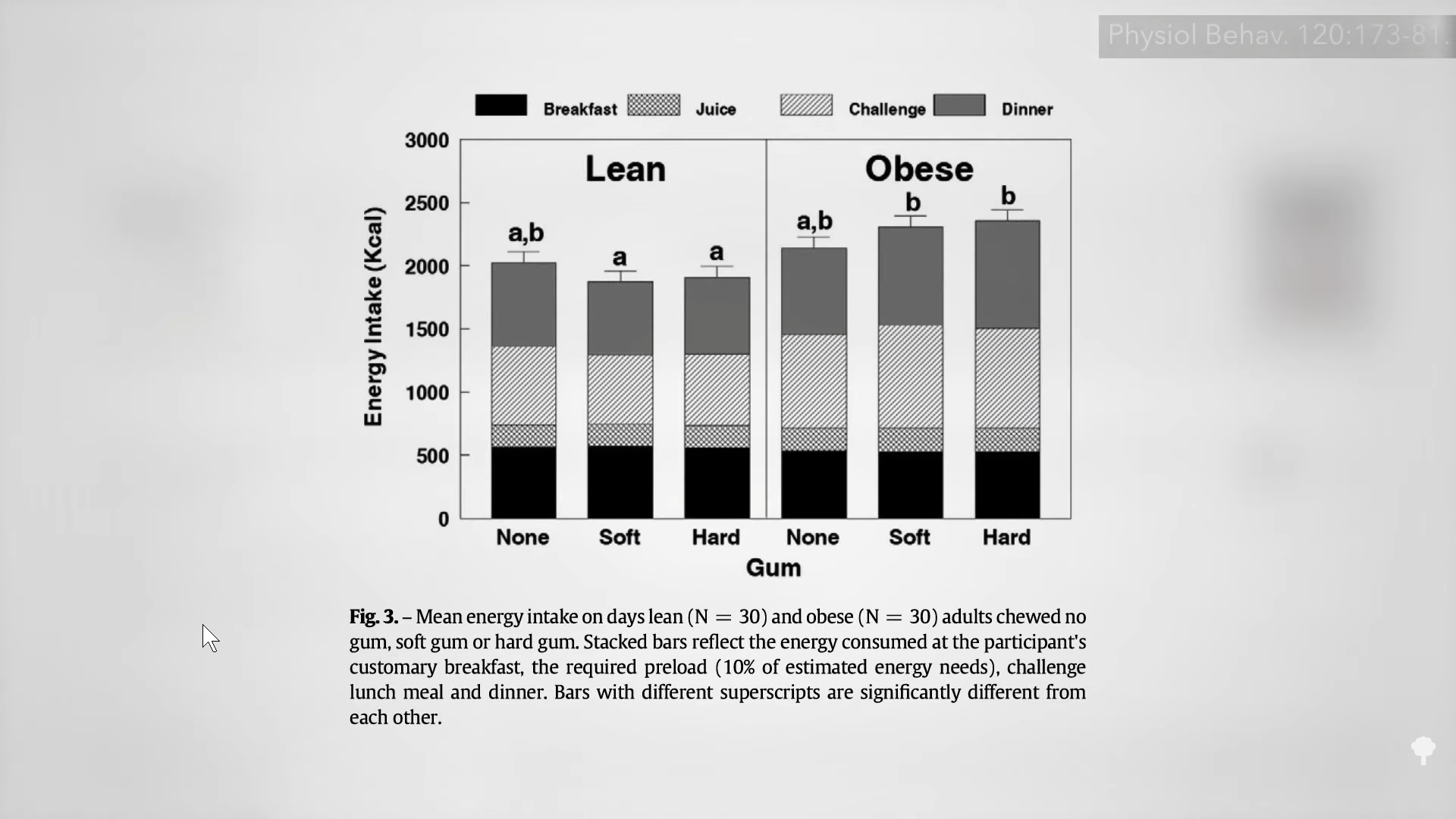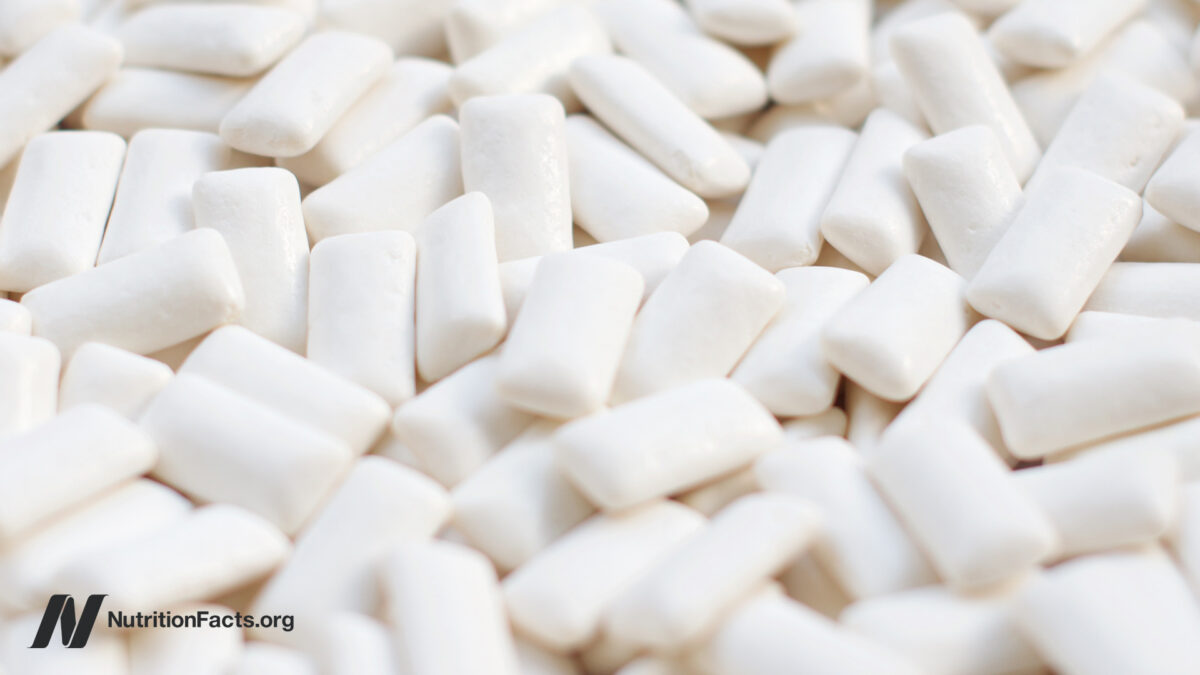What are the effects of chewing gum on hunger and appetite?
“Horace Fletcher,” proclaimed one of his obituaries in 1919, “taught the world to chew.” Also known as the “Great Masticator,” Fletcher was a health reformer who popularized the idea of chewing each mouthful more than 32 times—“once for every tooth.” It wasn’t put to the test, though, until nearly a century later. In that study, participants were told to eat pasta until they felt “comfortably full” and were randomized to chew each mouthful either 10 times or 35 times before swallowing. The subjects were told the study was about the effects of chewing on mood, but that was just a ruse. The researchers really wanted to know whether prolonged chewing reduced food intake. And, as it turned out, those who chewed more felt full earlier than those who chewed less, such that they ended up eating about a third of a cup less pasta overall.
If chewing suppresses the appetite in some way, what about chewing gum as a weight-loss strategy? As I discuss in my video How Many Calories Do You Burn Chewing Gum?, an article entitled “Benefits of Chewing Gum” suggested as much by saying that it “may be a useful behavior modification tool in appetite control and weight management,” but it was co-written by the executive director of The Wrigley Science Institute and a senior manager at the Wm Wrigley Jr Company. Why don’t we see what the unbiased science says?
Big Gum likes to point to a letter published in 1999 in The New England Journal of Medicine. In it, Mayo Clinic researchers claimed that chewing gum could burn 11 calories an hour. Critics pointed to the fact that they didn’t really test “typical” gum chewing; they instead tested chewing the equivalent of four sticks of gum “at a very rapid cadence.” Specifically, the participants were told to chew at a frequency of exactly 100 Hertz (Hz) “with the aid of a metronome” for 12 minutes. That seemed to burn 2.2 calories, hence, potentially 11 calories an hour.
One might have had more confidence in the Mayo scientists’ conclusion had they not lacked a fundamental understanding of basic units. As defined by Merriam-Webster, hertz is a unit of frequency equal to one cycle per second, so 100 Hz would mean 100 chews per second. (That would be a very rapid cadence!) If it’s true that 11 calories may be burned an hour, though, that means you could burn more calories actively chewing gum while sitting in a chair than you would if you weren’t chewing gum while upright at a standing desk.
In fact, as you can see in the graph below and at 2:24 in my video, chewing one small piece of gum at your own pace may only burn about three calories an hour, which would approximate the calorie content of the sugar-free gum itself. However, chewing off the calories of a piece of sugar-sweetened gum might take all day. What about the purported appetite-suppressing effect of all that chewing, though?

The results from studies on the effects of chewing gum on hunger are all over the place. For example, as you can see in the graph below and at 2:50 in my video, one showed decreased appetite, another showed no effect, and yet another even showed significantly increased hunger in women after chewing gum. The more important question, though, is whether there are any changes in subsequent calorie intake. Again, the findings are mixed.

One study, as you can see in the graph below and at 3:12 in my video, even found that while chewing gum didn’t impact M&M consumption much, it did appear to decrease the consumption of healthy snacks. Interesting, but the researchers used mint gum, and the healthy snacks included mandarin orange slices. So, that may have just been an orange juice-after-tooth-brushing effect.

It can take an hour before the residual taste effect of mint toothpaste dissipates. This is bad if it cuts your fruit intake, but what about harnessing this power against Pringles? An international group of researchers had people eat Pringles potato chips for 12 minutes, interrupting them every 3 minutes to swish with a menthol mouthwash. As you can see in the graph below and at 3:50 in my video, compared to those in the control groups (swishing with water or nothing at all), the minty mouthwash group cut their consumption by 29 percent. The researchers concluded: “If a consumer finds themselves snacking on too many crisps [potato chips] during a given eating occasion, one potential strategy could be intervening by having a peppermint tea, menthol flavoured chewing gum, or brushing their teeth, to slow down or stop snacking.”

What we’re wondering about, though, is weight loss. Even if a little tweak like chewing gum can affect the consumption of a single snack, your body could just compensate by eating more later in the day. The only way to know for sure if chewing gum can be used as a weight-loss hack is to put it to the test, which I cover in my video Does Chewing Gum Help with Weight Loss?
For more information on calories and weight loss, check out related videos below.
